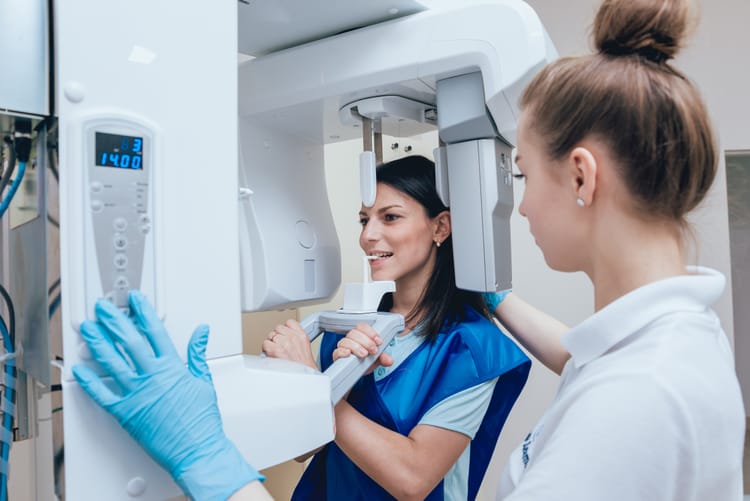Wait, veggies do what to teeth?

How confident are you in your retirement plan? The current economic environment makes for an uncertain future, but dentists can still build a strong retirement plan. Finances are important, but so is mental health. And, we talk to Dr. Bill Claytor about burnout and check out a podcast focused on building community.

Don't fall for this scam. A scammer called a member of the California Dental Association (CDA) claiming that their license was suspended, ultimately fraudulently taking a chunk of money. The CDA member shares a warning and lessons learned.
Providing dental care in Palestine. Dr. James Rolfe, an 85-year-old dentist practicing in California, went to Palestine to provide much-needed care.
Vegetables... bad for your teeth? Veggies are a part of a healthy diet, but a new study found that microscopic particles in plants can damage enamel.
AI and the end of surprise bills? Overjet is aiming to make patient payment more transparent. Its Review Pass tool enables dentists to inform patients of their financial responsibility in real time.
100 years and a Stanley Cup. Retired dentist Dr. Irvin Paul celebrated his 100th birthday and recalled how he served as the dentist for the Philadelphia Flyers when the team won the Stanley Cup.

'Normalize the term 'burnout'
Burnout is a common challenge among dentists, and it has grown significantly in the wake of the Covid pandemic.
J. William "Bill" Claytor, Jr., DDS, MAGD, associate director of North Carolina Caring Dental Professionals (NCCDP), knows firsthand how tough living and working through burnout can be. He shares how his perspective on burnout has evolved and offers insight into how dentists can get help.
How has your perspective on burnout in dentistry changed over the course of your career?
My perspective has changed from “I don't want to get it; I don't want to talk about it” to “It's an ever-present danger that we are all susceptible to,” mainly because of the way we practice.
Most of us dentists are still in some form of solo practice. We tend to be isolated. We tend to be thinkers and introverts in the way we process and recharge our batteries. And sometimes we feel like we have to have all the answers. And so, I think my perspective now is to normalize the term burnout to say it's part of who we are. The big thing is just to ask for help, and that's a huge ask for a lot of dental professionals.
Do you think dentists are more willing to talk about burnout? How much stigma do you still see in the industry?
The good news is I think the message in the last eight or nine years has really been getting out to the dental community through the American Dental Association and state dental societies.
The very good news is that the younger dentists coming out of dental school, in the last five or 10 years, they're getting a lot of this training. Now, the stigma still is there, but I think we're seeing signs that they're more open to talking about things like this.
What resources are available for dentists who are struggling with burnout?
ADA.org/wellness is a great resource.
The North Carolina Caring Dental Professionals is one of 22 state-run dental programs that have resources available for dentists and dental hygienists. In the other 28 states, a lot of the dentists and dental hygienists would come under the umbrella of the physician health programs.
On a personal level, I wish I could get everybody to talk to what I call an accountability partner: somebody that you trust, that you share things with.
Responses have been edited for brevity and clarity.

When insurers buy dental practices
Delta Dental of Wisconsin acquired a group of dental practices in its home state, and the American Dental Association (ADA) is raising concerns. The ADA is working to understand the potential regulatory and legal issues associated with the transaction. It has concerns regarding an insurance company acting as both provider and payer.
Why it matters: As consolidation continues in dentistry, it is possible other insurance companies will look to acquire practices. The ADA's conflict of interest concerns regarding these kinds of transactions are an important consideration. (ADA News)
Finding community in dentistry and beyond
Dentistry is a stressful career, and dentists need support and connections. On the "Dentistry Talks" podcast, Andy Price shares his experience as a veteran and insight into his current work as a mental health advocate in the veteran community. The episode delves into the importance of community and how dentists can find the support they need in their personal and professional lives.
Why it matters: Dentists can take lessons from the military and other settings to better understand mental health and take steps to build a community of support. (Dentistry Talks)
Are you financially prepared for retirement?
Confidence in dentistry is wavering, David Phelps, DDS, writes in a Dental Economics article. But savvy dentists can take steps to build financial stability and a plan for retirement. Reducing bad debt, investing in tangible assets and strengthening business resiliency are among the actionable steps Dr. Phelps describes.
Why it matters: In times of economic uncertainty, retirement is still an achievable goal for dentists. But it takes planning and discipline to get there. (Dental Economics)

- Pennsylvania family practice welcomes third generation
- Chicago program aims to make starting dentistry careers more affordable
- Former UCLA dentistry dean releases autobiography
- Startup raises $6.1M for dentures, nightguards 3D printing platform
Don't be a stranger.
💠 Reply to this email to connect with our team.
💠 Forward Dental Bite to your colleagues.



